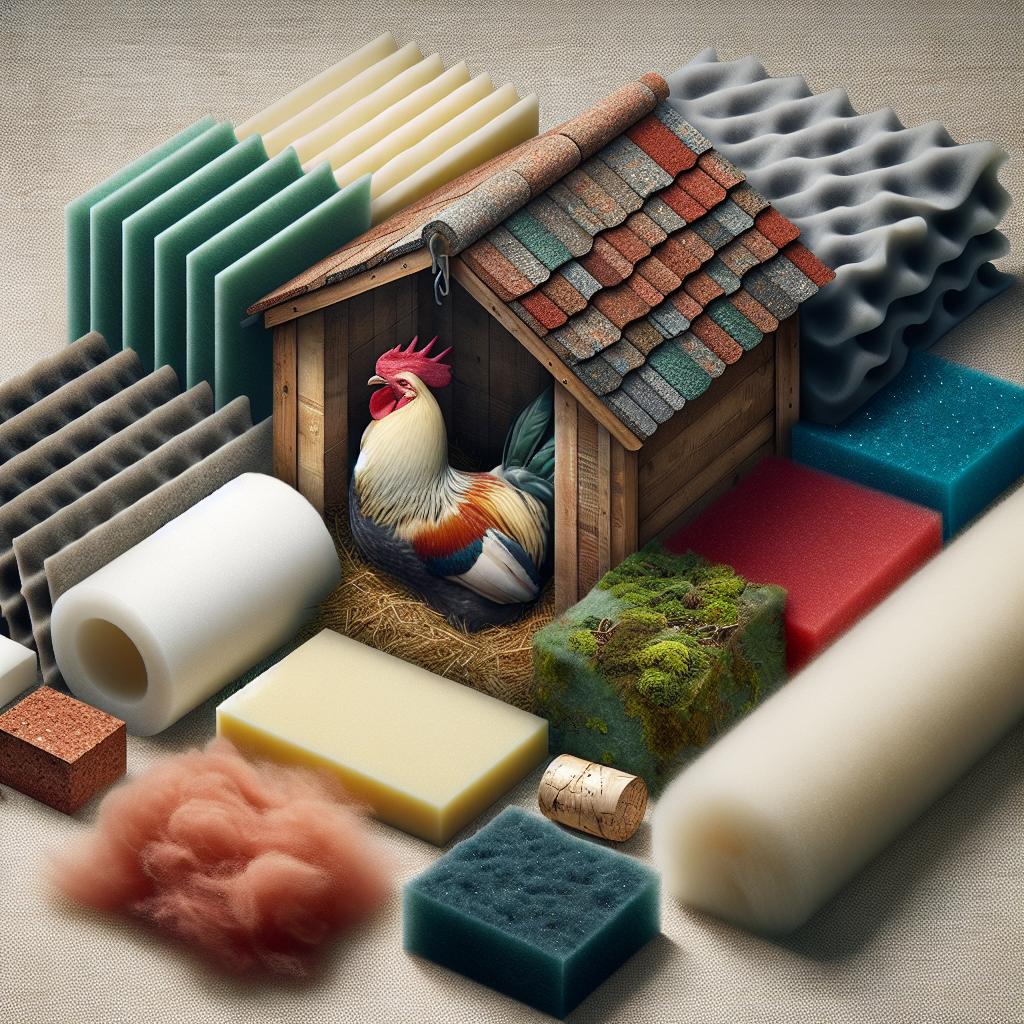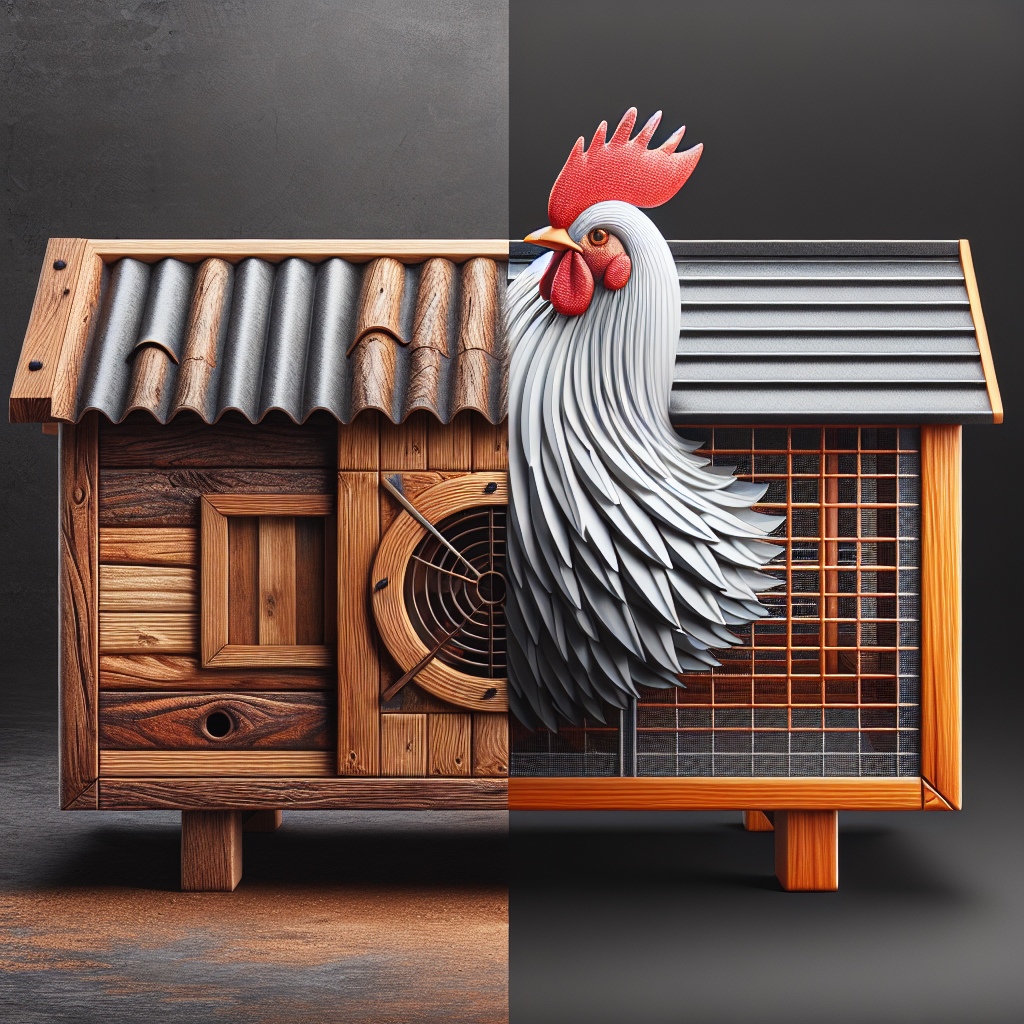If you’re embarking on the exciting journey of building a coop for your feathered friends, you may find yourself pondering the daunting question of which materials are best suited for your specific needs. Luckily, you don’t have to face this dilemma alone. A myriad of resources and experts are readily available to guide you through the process, helping you make informed decisions that will ensure a comfortable and safe home for your chickens. From online forums and instructional videos to agricultural experts specializing in poultry housing, this article explores the wealth of support you can tap into to navigate the vast array of materials and find the perfect fit for your coop.
1. Online Forums and Communities
1.1 Chicken Farmers Forum
When it comes to finding information and guidance on selecting the best materials for your specific coop needs, online forums and communities can be a valuable resource. The Chicken Farmers Forum is one such platform where you can connect with experienced poultry farmers and enthusiasts who are more than willing to share their knowledge and expertise. By joining this forum, you can ask questions, seek recommendations, and learn from the experiences of others who have already gone through the process of building or renovating their coops.
1.2 Backyard Chickens Community
Another online community that can serve as an excellent resource for selecting coop materials is the Backyard Chickens Community. This platform brings together backyard chicken keepers from all over the world, creating a space where you can interact, seek advice, and gain insights from a diverse group of poultry enthusiasts. Whether you’re looking for recommendations on the best materials for durability, insulation, or predator protection, the Backyard Chickens Community is a fantastic place to start your research.
1.3 Homesteading Today Forum
If you’re interested in a broader range of information related to homesteading and self-sufficiency, the Homesteading Today Forum is worth exploring. While not exclusively focused on poultry farming, this forum boasts a vibrant community of homesteaders who can offer guidance on various aspects of coop construction and materials selection. From understanding the benefits of different types of wood to discussing alternative eco-friendly materials, you can find valuable insights and recommendations from experienced homesteaders.
2. Agricultural Extension Offices
2.1 Local County Extension Office
Local county extension offices are government-funded organizations that provide valuable resources and support to farmers and home gardeners. These offices often have experts in agriculture who can provide guidance on selecting the best materials for your coop needs. They can provide information on choosing materials that are suitable for your specific climate, budget, and desired level of maintenance. Additionally, they may be able to recommend local suppliers or manufacturers who offer quality materials for coop construction.
2.2 State Agricultural Extension Office
In addition to local county extension offices, state agricultural extension offices can also be an excellent resource for guidance on selecting coop materials. These offices typically have broader networks and access to a wider range of agricultural experts. They can provide advice specific to your state’s agricultural conditions, regulations, and best practices. Whether you need assistance in choosing appropriate roofing materials, insulation, or ventilation systems, the experts at the state agricultural extension office can offer valuable insights.
2.3 National Cooperative Extension System
The National Cooperative Extension System is a nationwide network of extension offices that serve as an invaluable resource for farmers and agricultural enthusiasts. This system collaborates with land-grant universities and the United States Department of Agriculture (USDA) to provide science-based information and expertise on various agricultural topics, including poultry farming. The National Cooperative Extension System can connect you with specialists in poultry production who can guide you in selecting the best coop materials based on your specific needs and goals.
3. Poultry Associations and Organizations
3.1 American Poultry Association (APA)
The American Poultry Association (APA) is an organization dedicated to promoting and preserving standard-bred poultry. While their primary focus is on promoting specific breeds and the exhibition poultry industry, the APA can still be a valuable resource for selecting coop materials. Members of the APA often have extensive knowledge and experience in poultry farming and can offer recommendations on coop construction and materials. Additionally, the APA may have resources or publications that provide guidelines or standards for coop design and material selection.
3.2 United States Poultry & Egg Association (USPOULTRY)
The United States Poultry & Egg Association (USPOULTRY) is a national trade organization that represents the poultry industry. While their main focus is on commercial poultry production, they still provide resources and support for small-scale poultry farmers as well. The USPOULTRY can connect you with industry experts who can provide insights on coop materials based on their experience in the field. Whether you’re looking for advice on flooring options, nesting boxes, or fencing materials, the USPOULTRY can be a valuable resource.
3.3 National Chicken Council (NCC)
The National Chicken Council (NCC) is another industry association that represents chicken producers in the United States. While their primary focus is on the commercial chicken industry, they still offer resources and information that can benefit small-scale poultry farmers. The NCC can connect you with experts who can provide guidance on selecting materials for coop construction, particularly in areas related to biosecurity, animal welfare, and regulatory compliance. Their resources and expertise can help ensure that your coop meets industry standards and best practices.
4. Professional Veterinarians
4.1 Local Avian Veterinarians
When it comes to selecting materials for your coop, it’s essential to consider the health and safety of your flock. Local avian veterinarians are professionals who specialize in the health and well-being of birds, including poultry. These veterinarians can provide valuable insights on coop materials that promote good sanitation, prevent the spread of diseases, and ensure the overall health of your chickens. By consulting with a local avian veterinarian, you can receive recommendations on materials that are durable, easy to clean, and resistant to bacterial growth.
4.2 Poultry Veterinary Associations
Poultry veterinary associations are organizations that bring together professionals in the field of avian medicine, particularly focused on poultry health. These associations can provide you with information on the latest advancements in poultry health and welfare. By reaching out to these associations, you can access a network of experts who can offer guidance on selecting coop materials that contribute to the overall well-being and disease prevention of your poultry. They can provide recommendations on materials that are safe, non-toxic, and suitable for the specific needs of your flock.
5. Cooperative Development Centers
5.1 Local Cooperative Development Centers
Cooperative development centers are organizations that support the establishment and growth of cooperative businesses, including agricultural cooperatives. These centers can provide guidance and resources to individuals or groups interested in forming a coop focused on poultry farming. By reaching out to a local cooperative development center, you can receive assistance in selecting coop materials that align with the cooperative’s goals, values, and budget. They can provide recommendations on materials that are cost-effective, sustainable, and meet the specific needs of the cooperative members.
5.2 State Cooperative Development Centers
In addition to local cooperative development centers, state cooperative development centers can provide valuable support and resources for poultry farming cooperatives. These centers often have a broader scope and can connect you with experts who have experience in various aspects of cooperative development and management. When it comes to selecting materials for your coop, state cooperative development centers can guide you in making decisions that prioritize the cooperative’s long-term sustainability, environmental impact, and economic viability.
5.3 National Cooperative Business Association (NCBA)
The National Cooperative Business Association (NCBA) is a national organization that represents and advocates for cooperative businesses across various industries, including agriculture. While not specifically focused on poultry farming, the NCBA can provide support and resources for individuals or groups interested in starting a poultry farming cooperative. Their expertise in cooperative principles and practices can be valuable in selecting coop materials that align with the cooperative’s mission, values, and business model.
6. Sustainable Agriculture Programs and Organizations
6.1 Sustainable Poultry Network (SPN)
The Sustainable Poultry Network (SPN) is an organization that promotes sustainable and heritage poultry production. Their focus is on preserving rare and endangered breeds of chickens and promoting sustainable farming practices. When it comes to selecting materials for your coop, the SPN can offer guidance on environmentally friendly and sustainable options. They can provide information on materials that are renewable, non-toxic, and promote energy efficiency. By incorporating sustainable practices into your coop construction, you can minimize the environmental impact of your poultry farming operation.
6.2 Organic Farming Associations
If you’re interested in organic poultry farming, organic farming associations can be a valuable resource for selecting coop materials that align with organic farming standards. These associations promote organic farming practices, including the use of organic-approved materials and practices. By reaching out to organic farming associations, you can gain insights into materials that are certified organic, free from synthetic chemicals, and meet the requirements for organic certification. They can provide recommendations on materials that promote the health and welfare of your birds while maintaining organic integrity.
7. Agricultural Trade Shows and Expos
7.1 Poultry Industry Expos
Attending poultry industry expos and trade shows can be an excellent way to gather information on the latest innovations and advancements in coop materials. These events bring together industry suppliers, manufacturers, and experts who showcase their products and share their expertise. By visiting poultry industry expos, you can engage directly with suppliers of coop materials, ask questions, and compare different options. Industry expos provide a hands-on experience, allowing you to assess the quality, durability, and functionality of various materials before making a decision.
7.2 Livestock Equipment Trade Shows
Livestock equipment trade shows also offer opportunities to explore a wide range of materials and equipment suitable for poultry farming. While not poultry-specific, these trade shows often feature exhibitors that offer coop materials and equipment necessary for poultry housing. By attending livestock equipment trade shows, you can explore a broader range of options and innovations, gather expert advice, and make informed decisions based on your specific needs and budget. These events are a great way to connect directly with suppliers and manufacturers, fostering relationships that can be beneficial in the long run.
8. Local Farmers and Coop Members
8.1 Visiting Local Farms
Visiting local farms can provide firsthand experience and insights into different coop materials and construction methods. By connecting with fellow poultry farmers in your locality, you can learn from their experiences, observe the functionality of their coops, and ask questions about materials they have used. Farmers are often willing to share their knowledge and provide practical advice based on their successes and challenges. By visiting local farms, you can gain real-world perspectives that can help inform your own decisions when selecting coop materials.
8.2 Joining Coop Member Associations
Joining coop member associations allows you to connect with other individuals who are part of poultry farming cooperatives. These associations often organize meetings, workshops, and networking events where members can share their experiences and insights. By becoming a member of a coop association, you can access a network of coop owners who can offer guidance and recommendations on coop materials based on their collective knowledge. Additionally, coop member associations may have resources or publications specifically tailored to coop construction, ensuring you have access to relevant and reliable information.
9. Online Research and Publications
9.1 Academic Journals and Research Papers
Online research and academic journals are excellent resources for in-depth information on coop materials and construction methods. Accessing academic journals and research papers in the field of poultry science can provide you with scientifically backed knowledge on the optimal materials for your coop needs. These sources often discuss studies, experiments, and evaluations of different materials’ performance, durability, and impact on bird health. By delving into online research and academic publications, you can gather objective information that can help you make informed decisions when selecting coop materials.
9.2 Books and Publications on Poultry Farming
Books and publications on poultry farming can also be valuable sources of information on coop materials. Many authors, farmers, and industry experts have written comprehensive guides and manuals on various aspects of poultry farming, including coop construction and materials selection. By exploring these resources, you can gain insights into different materials, construction techniques, and best practices. Books and publications often provide detailed explanations, step-by-step instructions, and practical tips that can help you navigate the process of selecting the best materials for your specific coop needs.
10. Industry Suppliers and Manufacturers
10.1 Poultry Equipment Suppliers
Industry suppliers and manufacturers of poultry equipment are a direct source of information and guidance when it comes to selecting the best materials for your coop. Poultry equipment suppliers offer a wide range of materials specifically designed for coop construction, including roofing materials, insulation options, flooring systems, and more. By reaching out to these suppliers, you can consult with their experts, explain your specific coop needs, and receive personalized recommendations. Working directly with poultry equipment suppliers ensures you have access to high-quality materials and expertise tailored to your requirements.
10.2 Livestock Feed Manufacturers
While not directly related to coop materials, livestock feed manufacturers can still offer valuable guidance. The nutritional needs of your chickens can impact their overall health and well-being, which can indirectly affect the materials you choose for your coop. Livestock feed manufacturers possess expertise in poultry nutrition and can provide recommendations on feed types and compositions that promote strong and healthy birds. By ensuring your flock receives optimal nutrition, you contribute to their overall health and reduce the likelihood of health issues that may lead to coop-related problems.
In conclusion, selecting the best materials for your specific coop needs is a crucial step in poultry farming. Fortunately, numerous resources and experts are available to guide you through this process. Online forums and communities, agricultural extension offices, poultry associations, professional veterinarians, cooperative development centers, sustainable agriculture programs and organizations, agricultural trade shows, local farmers, online research and publications, as well as industry suppliers and manufacturers, all offer unique insights and expertise. By tapping into these resources and reaching out to the experts, you can make informed decisions and create a coop that meets your poultry farming goals while ensuring the health, safety, and welfare of your flock.




